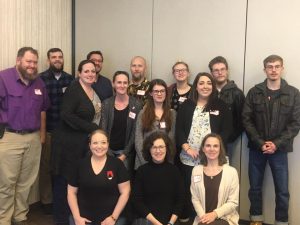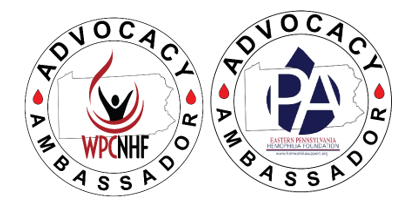
Advocacy Ambassador Program
To help drive the efforts of the Pennsylvania Hemophilia Foundations, we are launching an Advocacy Ambassador Program. Advocacy Ambassadors are volunteers in a leadership position responsible for helping to establish and build a strong grassroots network of bleeding disorders advocates within Pennsylvania. The goal is to increase awareness of Hemophilia, von Willebrand disease, and other factor deficiencies and the challenges persons affected and their families face. Ambassadors serve as liaisons between the Pennsylvania Bleeding Disorders Foundations and the public, state agencies and officials working towards improving the quality of life of individuals and their families who are affected by bleeding disorders. Both Foundations are committed to our volunteer’s engagement and contributions to the bleeding disorders community. We are committed to providing a worthwhile and impactful volunteer experience through the Advocacy Ambassador Program.
Why Should I Join?
Members of the Hemophilia Foundations of Pennsylvania Advocacy Ambassador Program are part of the hundreds of bleeding disorders community members throughout the nation working towards improving the lives of individuals with Hemophilia, von Willebrand disease and other rare bleeding disorders and assuring their access to affordable care and treatment. The opportunity to be an Advocacy Ambassador enables you to:
- Connect with other community members, caregivers, and stakeholders, within our state and nation through calls, webinars, and in-person meetings and events
- Participate in local and national events to connect, learn and address the bleeding disorders leading issues
- Develop relationships with key decision-makers and opinion leaders
- Share your story to help other community members by raising awareness
- Address issues of access to treatment and care at the state and national level
- Increase the awareness of those challenges to key decision-makers and elected officials in the state that can take action to make essential changes
What is the Role of an Ambassador?
Advocacy Ambassadors are volunteers interested in helping to lead our state’s grass root advocacy efforts and promote the importance of becoming an advocate within our community. They will participate in the following in-person and online activities:
- Help recruit new advocates to join our ambassador program
- Help to develop state-based Advocacy events and campaigns for increasing awareness on the issues of importance to the families and caregivers
- Contribute to our state and national campaigns to take action on
- Represent our state at Advocacy events and our Legislative Day
- Develop relationships with key decision-makers on state and national policy issues
- Help mobilize our state in advocacy throughout the year, especially during March, the Bleeding Disorders Awareness Month and our State Legislative Day
- Represent both PA Foundations positively
What is the Commitment?
Advocacy Ambassadors will be asked to commit to one calendar year. They may remain part of the Ambassador program as long as they desire, proving they are active ambassador members and represent the Pennsylvania Hemophilia Foundations in a respectful and positive way. Ambassadors will be asked to join quarterly conference calls to receive any training, education, as well as up-to-date news and information on campaigns, issues, and progress of the work. Ambassadors may be asked to do some travel to events within the state.
What are the Qualifications:
- Must live in Pennsylvania
- Must be active member of either Pennsylvania Hemophilia Foundation
- Must be connected to the Bleeding Disorders community
- Possess good organizational and communication skills
- The ability to speak comfortably in public settings
- Have the skills needed to work collaboratively and professionally with others
- A passion for advocating for bleeding disorders and desire to make change
- Knowledge and understanding of our organization
Contact Kara Dornish (kara@wpcnhf.org) or Janet Barone (janet@wpcnhf.org) for more information.


